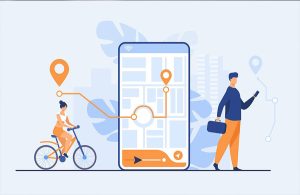Because of fast technological improvements, the way we commute from one location to another has changed substantially throughout the years. Technology has transformed the way we travel, from traditional forms of transportation to the rise of electric automobiles and ride-sharing programmed. In this blog, we will look at how technology is changing the way we commute and how it affects our everyday life.
1. Smart Cities and Connected Infrastructure:-
Technology-enabled infrastructure is critical to improving the commuting experience. Smart traffic lights, for example, employ real-time data to adjust signal timings based on traffic circumstances, boosting traffic flow and lowering idle time. Furthermore, networked infrastructure enables for seamless integration of diverse modes of transportation, allowing multi-modal commuting alternatives and lowering reliance on private automobiles.

2. Electric Vehicles: A Long-Term Trend:-
The growth of electric cars (EVs) is one of the most noticeable developments in the commuting scene. With increased concern about climate change and environmental sustainability, electric vehicles (EVs) have gained popularity as a cleaner and greener alternative to typical petrol or diesel-powered vehicles. Battery technology developments have increased the range of EVs, making them a feasible choice for longer trips. Furthermore, the creation of a broad charging infrastructure has aided in the acceptance of electric cars.
3. Carpooling and Ride-Sharing: Embracing Shared Mobility:-
Ride-sharing services such as Uber and Lyft have changed the way we think about transportation. These services make commuting more comfortable and economical by allowing people to share rides with others travelling in the same direction. Ride-sharing helps ease traffic congestion and saves carbon emissions by optimizing’s routes and lowering the number of automobiles on the road. In addition, the integration of ride-sharing services with smartphone apps has made booking and tracking rides simple and effective.

4. Intelligent transportation systems (ITS):-
Intelligent Transportation Systems (ITS) have significantly improved commuting efficiency and safety by leveraging technologies such as sensors, cameras, and data analytics to monitor traffic conditions in real-time, optimism signal timings, and provide dynamic route guidance to drivers. By reducing congestion and minimizing travel time, ITS improves the overall commuting experience while minimizing fuel consumption and emissions.
5. Self-driving cars:-
The introduction of self-driving cars has the potential to change the way we commute in the future. Self-driving cars, which are outfitted with advanced sensors, artificial intelligence, and networking, hold the potential of providing safer and more efficient transportation. Commuters may regain significant time with driverless vehicles by participating in constructive activities throughout their rides. Furthermore, the integration of self-driving vehicles with ride-sharing services might result in improved fleet management and reduced traffic congestion.





